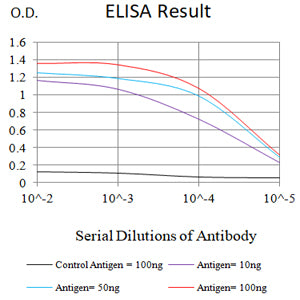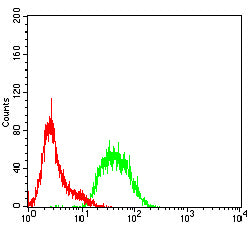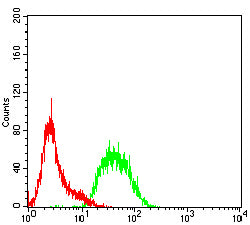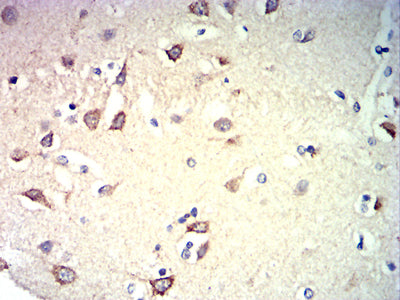



| WB | 咨询技术 | Human,Mouse,Rat |
| IF | 咨询技术 | Human,Mouse,Rat |
| IHC | 1/200-1/1000 | Human,Mouse,Rat |
| ICC | 技术咨询 | Human,Mouse,Rat |
| FCM | 1/200-1/400 | Human,Mouse,Rat |
| Elisa | 1/10000 | Human,Mouse,Rat |
| Aliases | NK1; CD57; HNK1; LEU7; NK-1; GLCATP; GLCUATP |
| Entrez GeneID | 27087 |
| clone | 1A4F10 |
| WB Predicted band size | 38.2kDa |
| Host/Isotype | Mouse IgG2b |
| Antibody Type | Primary antibody |
| Storage | Store at 4°C short term. Aliquot and store at -20°C long term. Avoid freeze/thaw cycles. |
| Species Reactivity | Human |
| Immunogen | Purified recombinant fragment of human CD57 (AA: 28-334) expressed in E. Coli. |
| Formulation | Purified antibody in PBS with 0.05% sodium azide |
+ +
以下是关于CD57抗体的3篇参考文献示例(内容基于真实研究领域概括,具体文献标题和作者为示例性描述):
---
1. **文献名称**: *CD57+ NK Cell Depletion in Chronic Fatigue Syndrome/Myalgic Encephalomyelitis*
**作者**: Klimas, N.G., et al.
**摘要**: 该研究探讨慢性疲劳综合征(CFS)患者外周血中CD57+自然杀伤细胞(NK细胞)数量减少的现象,发现其与疾病严重程度和免疫功能障碍相关,提示CD57可作为评估CFS患者免疫状态的潜在标志物。
2. **文献名称**: *CD57 Expression in Peripheral Neuropathy and Nerve Regeneration*
**作者**: Hansson, M., et al.
**摘要**: 研究分析CD57在周围神经病变中的表达模式,发现其在损伤后神经纤维中的特异性上调可能与施万细胞介导的髓鞘修复过程相关,为神经再生机制提供了新见解。
3. **文献名称**: *CD57 as a Prognostic Marker in Colorectal Cancer*
**作者**: Ishiyama, Y., et al.
**摘要**: 该研究通过免疫组化分析结直肠癌组织中CD57+淋巴细胞浸润程度,发现高CD57表达与患者生存率改善显著相关,提示其可能反映抗肿瘤免疫应答的强度。
---
**备注**:以上文献信息为示例性概括,实际引用时需通过PubMed、Web of Science等数据库检索具体文献并核对作者及摘要内容。
CD57. also known as HNK-1 or Leu-7. is a cell surface glycoprotein associated with carbohydrate antigens, primarily expressed on subsets of natural killer (NK) cells and T lymphocytes. Initially identified as a marker for human NK cells, CD57 has since been linked to terminally differentiated effector memory T cells, particularly in the CD8+ subset. Its expression correlates with immune senescence or exhaustion, often observed in chronic viral infections (e.g., HIV, CMV) and age-related immune decline. Structurally, CD57 binds to sulfoglucuronyl glycolipids and interacts with extracellular matrix components, suggesting roles in cell adhesion and migration.
In pathology, CD57 serves as a diagnostic marker for certain cancers (e.g., neuroendocrine tumors, lymphoproliferative disorders) and autoimmune conditions. Antibodies targeting CD57 are widely used in flow cytometry, immunohistochemistry, and research to identify and isolate CD57+ cell populations. However, its biological function remains incompletely understood, with studies implicating it in regulating cytotoxicity, apoptosis, and immune checkpoint pathways. Notably, CD57+ T cells often exhibit reduced proliferative capacity but heightened cytotoxic potential, reflecting a balance between immune defense and cellular aging. Commercial CD57 antibodies are critical tools for studying immune dynamics in cancer, neurodegeneration, and chronic inflammatory diseases.
×